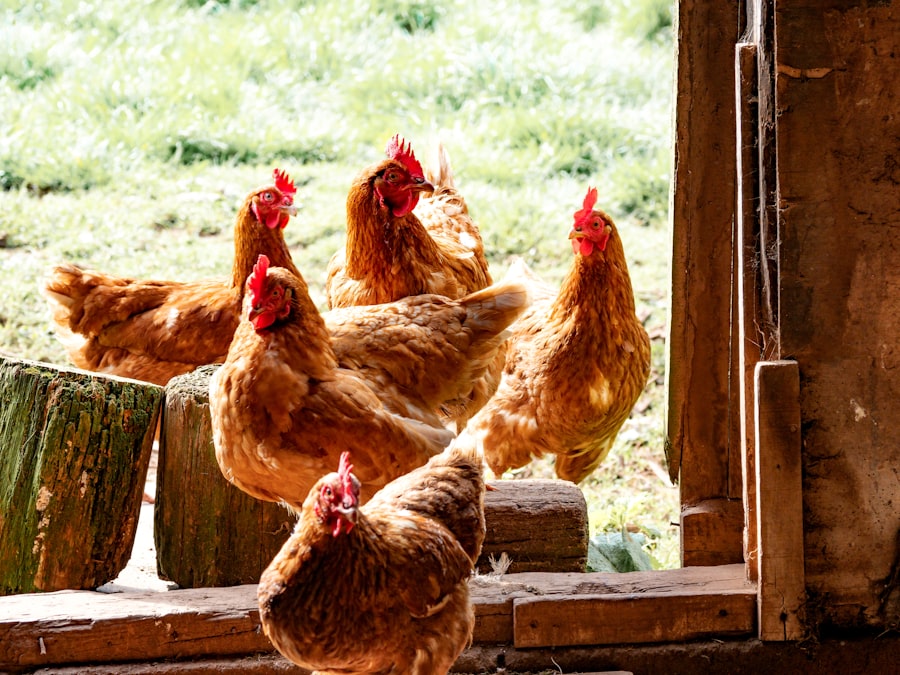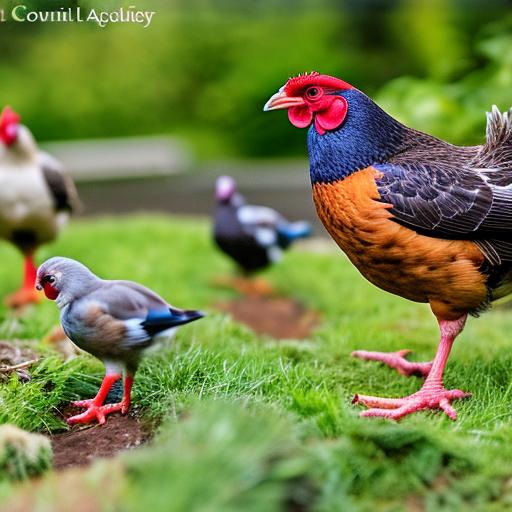Keeping chickens in your backyard has become a popular trend in recent years. Not only do they provide fresh eggs, but they also make great pets and can help control pests in your garden. Whether you live in a rural area or an urban setting, raising chickens can be a rewarding and enjoyable experience.
In urban areas, the trend of keeping chickens in backyards has been on the rise. Many people are realizing the benefits of having their own fresh eggs and the joy of caring for these feathered friends. It is a sustainable and self-sufficient way to provide food for your family while also connecting with nature.
Key Takeaways
- Keeping chickens in your backyard can be a fun and rewarding experience.
- Backyard chickens can provide fresh eggs, natural pest control, and fertilizer for your garden.
- Before keeping backyard chickens, it’s important to check local laws and regulations.
- When choosing a breed of chicken, consider factors such as temperament, egg production, and climate adaptability.
- Setting up a secure coop and providing proper care and nutrition are essential for the health and well-being of your backyard chickens.
Benefits of keeping chickens in your backyard
One of the main benefits of keeping chickens in your backyard is having a constant supply of fresh eggs. There is nothing quite like collecting eggs from your own flock and enjoying them for breakfast. Not only are they delicious, but they are also healthier than store-bought eggs as they are free from antibiotics and hormones.
Chickens also make great pets. They have unique personalities and can be quite entertaining to watch. They are social animals and can be easily tamed with regular handling. Children especially enjoy interacting with chickens and learning about their behaviors.
Another benefit of having chickens in your backyard is pest control. Chickens love to eat insects, slugs, and other pests that can damage your garden. They will happily scratch and peck at the ground, helping to keep your garden free from unwanted critters.
Legal considerations for keeping backyard chickens
Before starting a backyard flock, it is important to familiarize yourself with the laws and regulations surrounding chicken keeping in your area. Some cities have specific ordinances that dictate the number of chickens allowed, coop requirements, and distance from neighboring properties.
It is crucial to check with your local government or zoning department to ensure that you are in compliance with all regulations. Failure to do so could result in fines or even having to get rid of your chickens. It is always better to be safe than sorry, so make sure to do your research before bringing home your feathered friends.
Choosing the right breed of chicken for your backyard
When choosing a breed of chicken for your backyard, it is important to consider their characteristics and suitability for your climate and living situation. There are many different breeds to choose from, each with its own unique traits.
Some breeds are known for their egg-laying abilities, while others are more ornamental or have specific meat qualities. If you are primarily interested in egg production, breeds such as Rhode Island Reds or Leghorns are good choices. If you are looking for a friendly and docile breed, consider Silkies or Orpingtons.
It is also important to consider the climate in which you live. Some breeds are better suited for cold weather, while others thrive in hot climates. Make sure to choose a breed that can handle the temperature extremes of your area.
Setting up a coop and run for your backyard chickens
A proper coop and run are essential for keeping backyard chickens. The coop provides shelter and a safe place for the chickens to roost and lay eggs, while the run allows them to have access to fresh air and exercise.
There are many different types of coops and runs available, ranging from small DIY projects to larger pre-made structures. The size of the coop and run will depend on the number of chickens you plan to keep. It is important to provide adequate space for each chicken, as overcrowding can lead to stress and health issues.
The coop should be well-ventilated and secure from predators such as raccoons or foxes. It should also have nesting boxes for the chickens to lay their eggs and perches for them to roost at night. The run should be enclosed with wire mesh to prevent predators from entering and should have enough space for the chickens to move around and forage.
Feeding and caring for backyard chickens

Feeding your backyard chickens a balanced diet is crucial for their health and egg production. There are different types of feed available, including pellets, crumbles, and mash. It is important to choose a feed that is appropriate for the age and breed of your chickens.
In addition to commercial feed, chickens also enjoy foraging for insects, worms, and greens. You can supplement their diet with kitchen scraps such as vegetable peels or leftover grains. It is important to provide clean water at all times, as chickens need to stay hydrated.
Caring for backyard chickens also involves regular cleaning of the coop and run. This helps to prevent the buildup of waste and keeps the living space clean and healthy for the chickens. Regularly changing bedding material and removing droppings will help prevent the spread of diseases.
Health concerns and preventative measures for backyard chickens
Chickens, like any other animals, can face health issues. It is important to be aware of common health problems that chickens may encounter and take preventative measures to keep them healthy.
Some common health issues in chickens include respiratory infections, parasites, and egg-laying problems. Regular check-ups with a veterinarian who specializes in poultry can help catch any potential issues early on.
Vaccinations are also an important preventative measure for backyard chickens. Vaccines can protect against diseases such as Marek’s disease or Newcastle disease. Consult with a veterinarian to determine which vaccines are necessary for your flock.
Egg production and collection from backyard chickens
Egg production in chickens is influenced by factors such as breed, age, diet, and lighting conditions. Most hens start laying eggs around 5-6 months of age, although this can vary depending on the breed.
To encourage egg production, it is important to provide a balanced diet and a consistent light source. Chickens need around 14-16 hours of light per day to stimulate egg-laying. This can be achieved by using artificial lighting in the coop during the winter months when daylight hours are shorter.
Collecting eggs regularly is important to prevent them from being damaged or becoming dirty. Eggs should be collected at least once a day and stored in a cool place until they are ready to be used.
Dealing with noise and odor from backyard chickens
Noise and odor can be a concern when keeping chickens in your backyard, especially if you live in an urban area or have close neighbors. However, there are ways to minimize these issues and be considerate of those around you.
To minimize noise, it is important to choose breeds that are known for being quieter, such as Silkies or Cochins. Regular handling and socializing of the chickens can also help reduce stress and noise levels.
To control odor, it is important to keep the coop and run clean. Regularly removing droppings and changing bedding material will help prevent the buildup of waste and minimize odor. Composting chicken manure can also be a sustainable way to manage waste and create nutrient-rich soil for your garden.
Conclusion and tips for successful backyard chicken keeping
Keeping chickens in your backyard can be a rewarding and enjoyable experience. Not only do they provide fresh eggs, but they also make great pets and can help control pests in your garden.
To ensure successful backyard chicken keeping, it is important to familiarize yourself with the laws and regulations surrounding chicken keeping in your area. Choosing the right breed of chicken for your backyard is also crucial, as well as setting up a proper coop and run.
Feeding and caring for backyard chickens involves providing a balanced diet, clean water, and regular cleaning of the living space. It is important to be aware of common health issues in chickens and take preventative measures such as vaccinations and regular check-ups.
Minimizing noise and odor from your backyard flock is important to be considerate of your neighbors. Socializing your chickens and keeping their living space clean can help achieve this.
In conclusion, keeping chickens in your backyard can be a fun and rewarding experience. With proper care and attention, you can enjoy fresh eggs, the companionship of these feathered friends, and the benefits they bring to your garden.
If you’re considering keeping chickens in your back garden, you may also be interested in learning about the possibility of keeping guinea fowl alongside them. Guinea fowl can be great companions for chickens, as they help to control pests and provide additional security. To find out more about whether guinea fowl can live with chickens, check out this informative article on Poultry Wizard: Can Guinea Fowl Live with Chickens? Additionally, if you’re looking for ways to ensure your chicken coop stays warm during colder months, Poultry Wizard offers a helpful guide on choosing the right heater for your chicken coop: Heater for a Chicken Coop. Lastly, if you’re interested in breeding chickens and want to know how long it takes for chicken eggs to hatch naturally, Poultry Wizard has an insightful article on the topic: How Long for Chicken Eggs to Hatch Naturally?
FAQs
Can I keep chickens in my back garden?
Yes, you can keep chickens in your back garden as long as you follow certain rules and regulations.
What are the rules and regulations for keeping chickens in my back garden?
The rules and regulations for keeping chickens in your back garden vary depending on your location. You should check with your local council or authority to find out what rules apply to you.
How much space do chickens need in a back garden?
Chickens need at least 1 square meter of space per bird in their coop, and at least 2 square meters of space per bird in their run. However, more space is always better for the chickens’ health and well-being.
What do chickens eat?
Chickens eat a variety of foods, including grains, seeds, fruits, vegetables, and insects. You can also feed them commercial chicken feed, which is formulated to provide all the nutrients they need.
Do chickens make a lot of noise?
Chickens do make noise, but it is generally not very loud. Roosters are the noisiest, but if you only keep hens, the noise level will be minimal.
Do chickens attract pests?
Chickens can attract pests such as rats and mice if their food is not stored properly. However, if you keep your coop and run clean and tidy, and store food in secure containers, you should not have a problem with pests.
Do I need a rooster to keep chickens?
No, you do not need a rooster to keep chickens. Hens will lay eggs regardless of whether there is a rooster present or not. However, if you want fertilized eggs to hatch into chicks, you will need a rooster.
Meet Walter, the feathered-friend fanatic of Florida! Nestled in the sunshine state, Walter struts through life with his feathered companions, clucking his way to happiness. With a coop that’s fancier than a five-star hotel, he’s the Don Juan of the chicken world. When he’s not teaching his hens to do the cha-cha, you’ll find him in a heated debate with his prized rooster, Sir Clucks-a-Lot. Walter’s poultry passion is no yolk; he’s the sunny-side-up guy you never knew you needed in your flock of friends!







